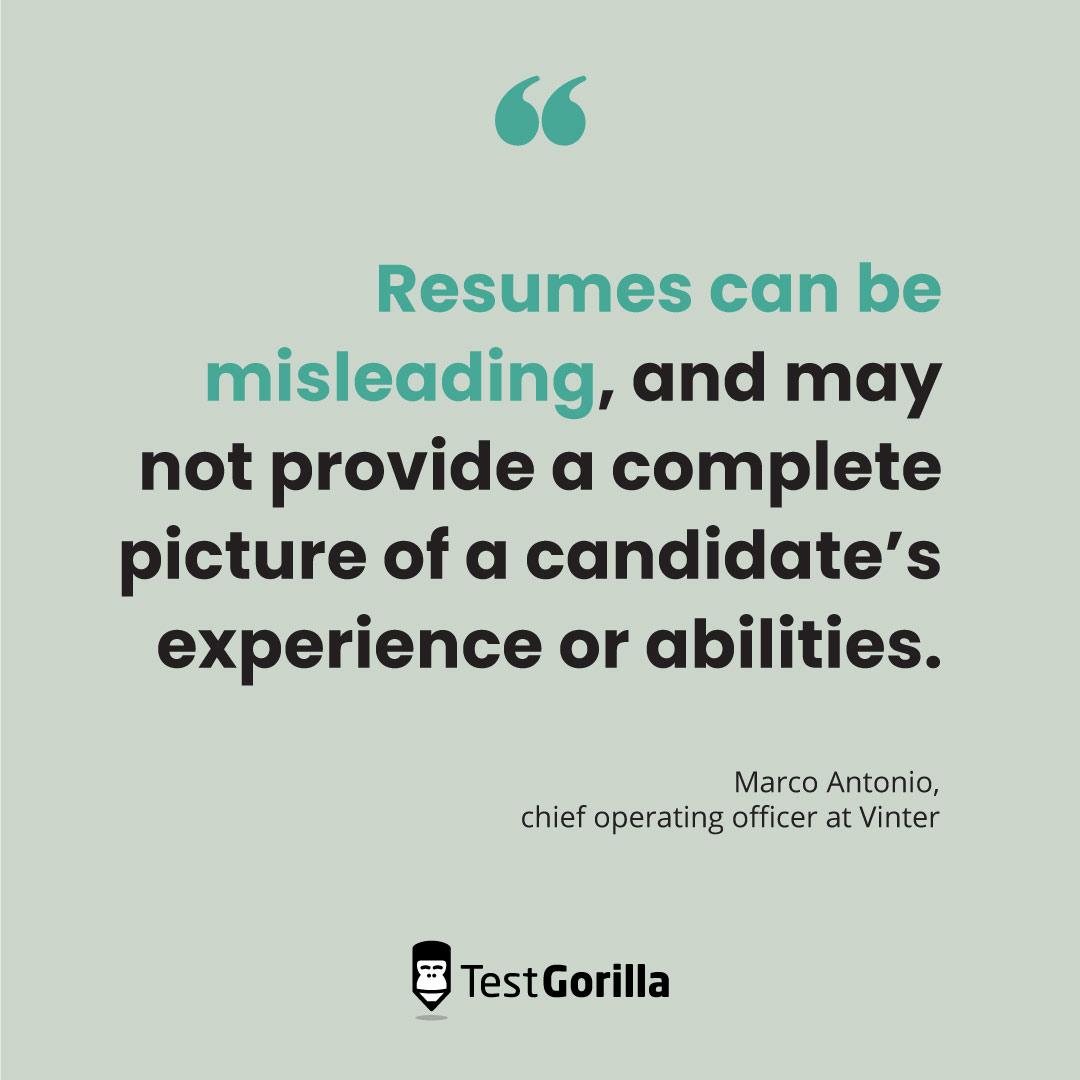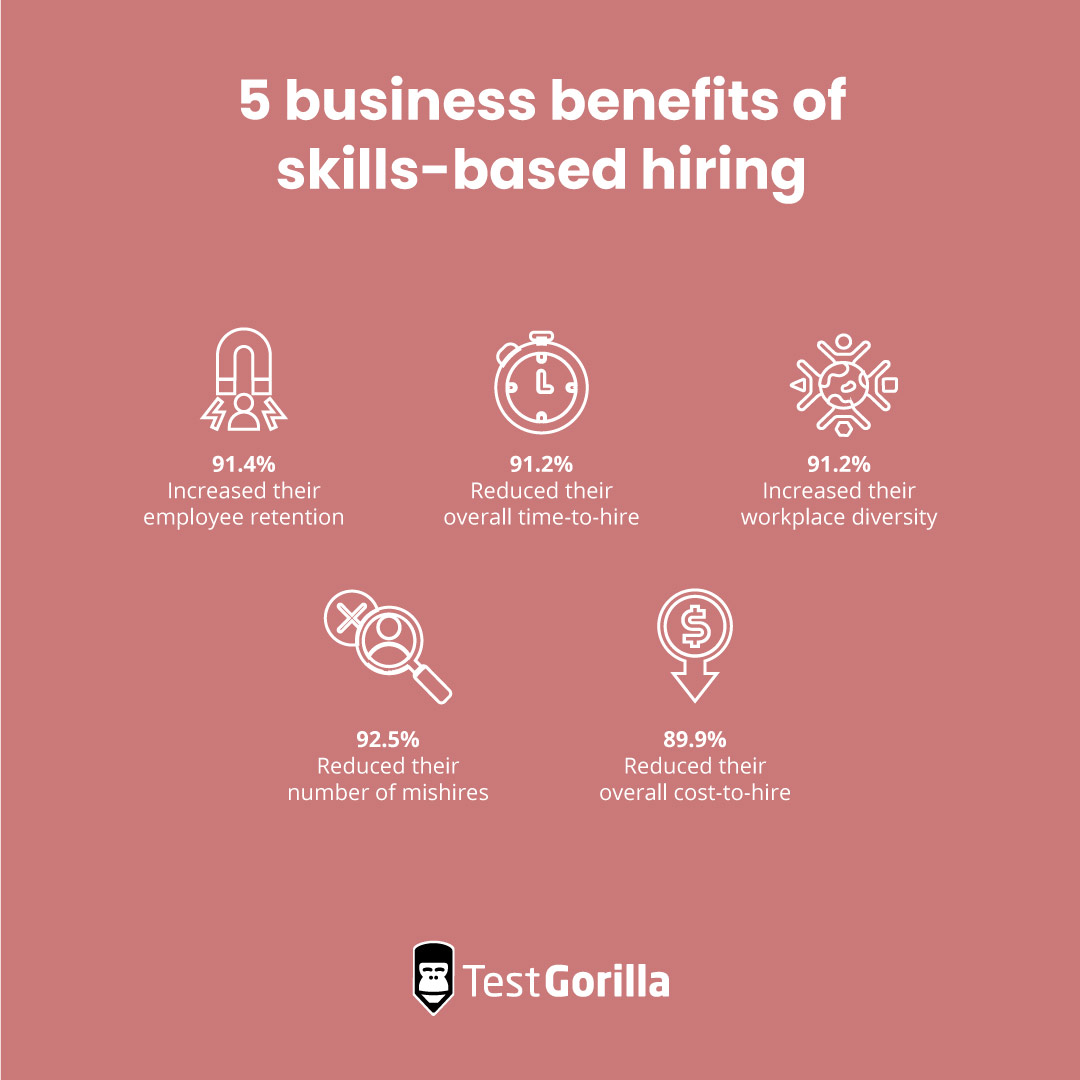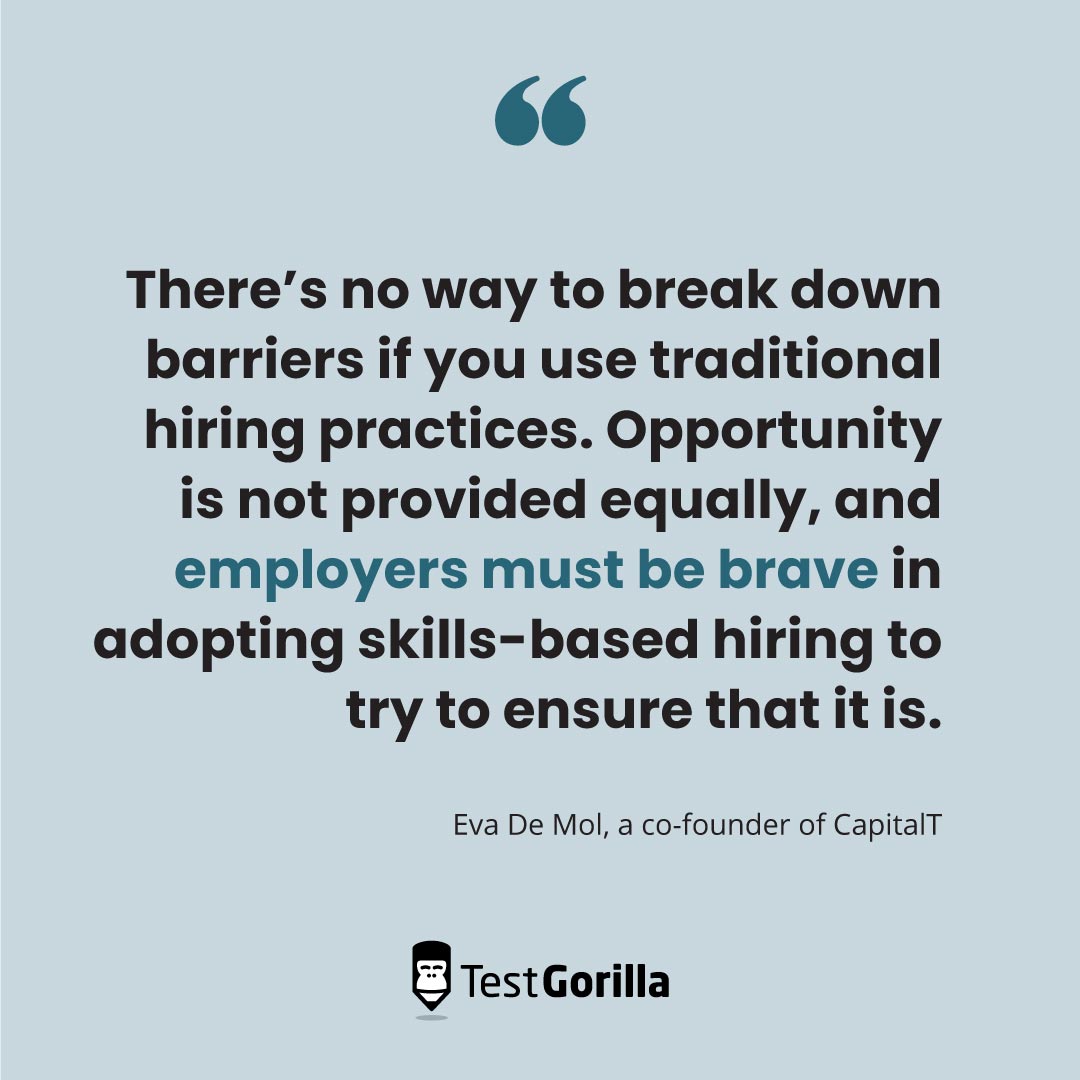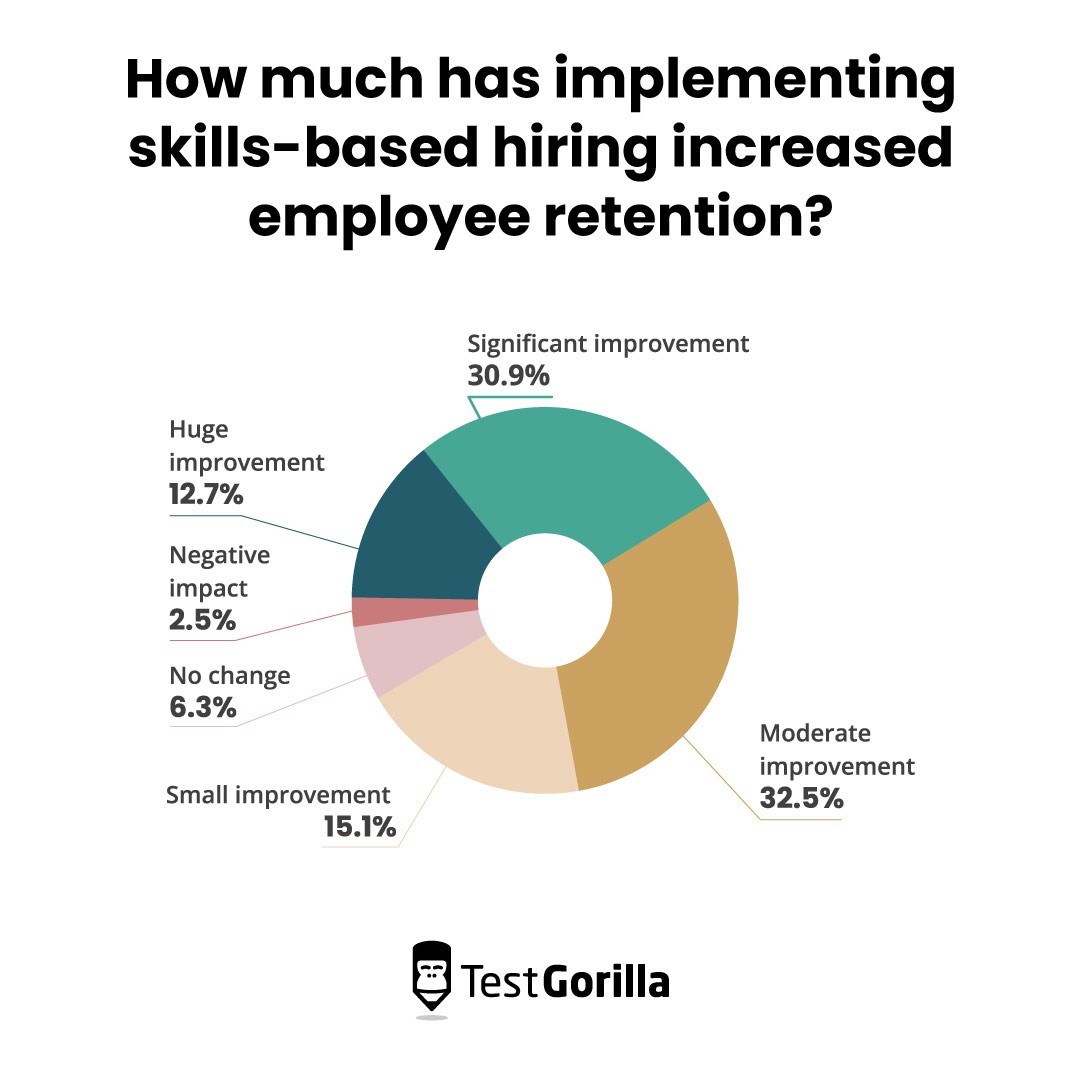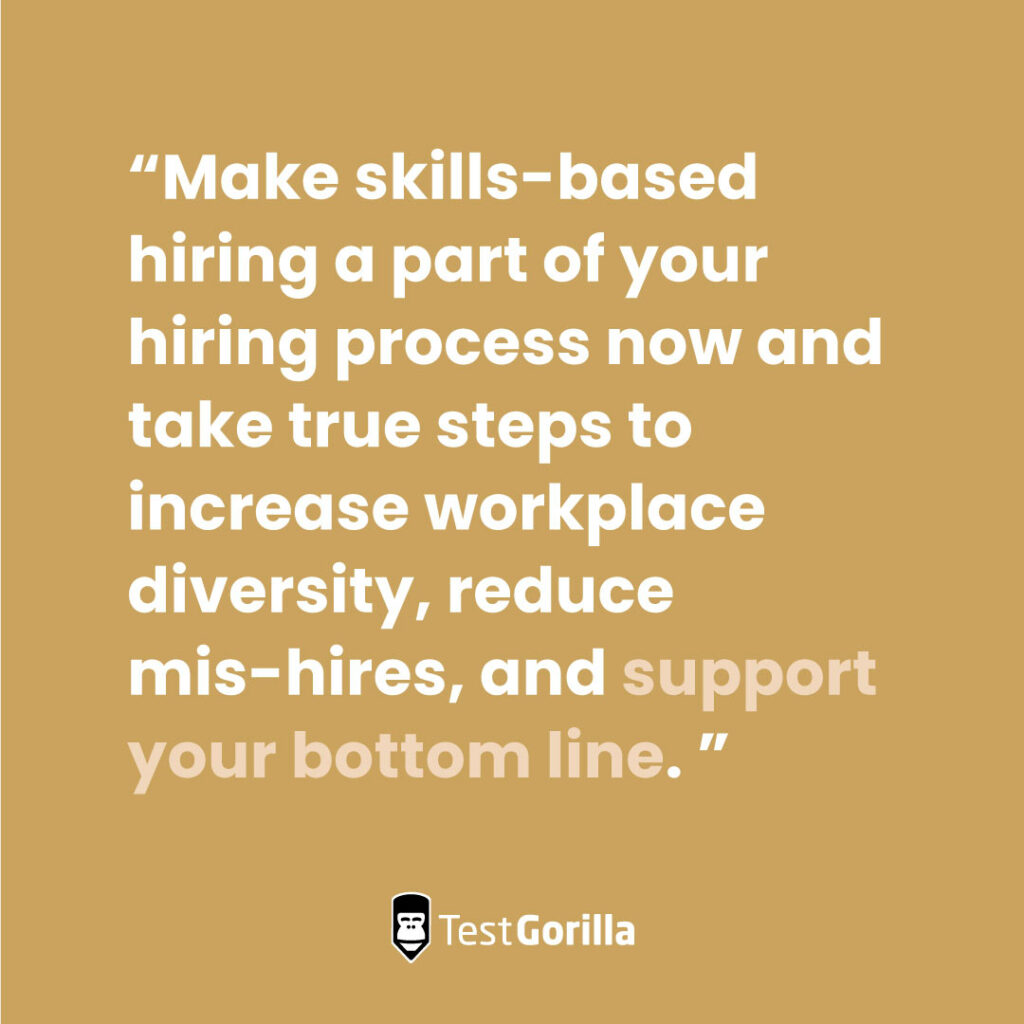The first resume was written in 1482. It’s high time this centuries-old hiring process got an update.
Skills-based hiring is a modern approach that lets candidates prove their skills through high-quality pre-screening assessments – and, in our experience, it’s the best way to find the ideal candidate for any open role.
Not only does skills-based hiring allow candidates to bring their best selves to the table by letting their talent shine, but it also helps businesses perfect their hiring processes, which can have a tremendous impact on their bottom lines. Plus, skills-based assessments make it easier to weed out candidates who’ve inflated their resumes or over-hyped their skill sets.
Thanks to our assessment-based process, we’ve hired more than 100 employees across 31 countries in just two years. This is no small feat when you consider we’re up against over 540 years of resume-based hiring as the status quo.
This is all to say that we know skills-based hiring works. But how can we prove it to someone who’s never considered ditching traditional hiring methods?
We turned to the experts – aka our own customers – and asked them to share their experiences with skills-based hiring. Their responses confirmed our suspicions: Skills-based hiring is clearly the way forward.
Here’s what they had to say.
Table of contents
Traditional hiring methods are limiting – and often inaccurate
Traditional recruitment and hiring practices fail because they over-rely on outdated materials like resumes in order to assess someone’s qualifications.
What’s wrong with a document that lists a person’s educational background, past jobs, and skill sets? The problem is that people can lie on or inflate their resumes in order to sound more skilled than they actually are.
“Resumes can be misleading,” according to Marco Antonio, chief operating officer at Vinter, “and may not provide a complete picture of a candidate’s experience or abilities.”
Language coding AI can match keywords on a resume but can’t assess whether or not someone actually possesses the skills they claim to have. The current system rewards people who understand how to plug keywords into their resumes while excluding people who choose to spend time working on their craft instead.
In our 2023 State of Skills-Based Hiring report, we found that skills-based assessments lead to dramatic improvements in the hiring process: 88% of the organizations we surveyed saw a reduction in mis-hires. That’s because these organizations take the extra step to ensure candidates can do the things they say they can do.
“Quite simply, a job is advertised as a bundle of skills,” says Sue St. Leger, a consultant at Sue St. Leger & Associates. “The assessment of the applicants is relevant to determine if the applicants could be this missing bundle.”
Skills-based hiring helps you make unbiased hiring decisions
Unconscious bias is an undeniable challenge in hiring, especially when it comes to the old-school way of hiring from your own network.
That’s where skills-based hiring comes in: The process is designed to help employers focus on what candidates know, not who they know.
“Skills-based hiring helps to ensure that hiring decisions are based on objective criteria,” says Antonio, “rather than subjective factors like a candidate’s background or education, which is often tied to their gender, race, disability, or socioeconomic status.”
Fortunately, diverse and equitable hiring is at the forefront of most leaders’ minds, and we’ve got the data to prove it. Of the businesses we surveyed in 2022, 80% reported having a goal to increase diversity. Additionally, 91% of those businesses that put a skills-based hiring strategy in place saw an increase in workplace diversity.
Reducing bias in hiring isn’t just a nice-to-have. There’s a direct link to increased revenue and better business performance. Companies that take active steps to combat bias among their workforce are 25% more likely to see above-average profitability compared to companies that don’t.
Eva De Mol, a co-founder of CapitalT, sums this up nicely: “There’s no way to break down barriers if you use traditional hiring practices. Opportunity is not provided equally, and employers must be brave in adopting skills-based hiring to try to ensure that it is.”
Skills-based hiring leads to happier, more satisfied employees
Best of all, the benefits of skills-based testing don’t stop once you hire someone. Employees who are a good fit for their role are more likely to stick around and be happier and more productive in their jobs.
“Skills testing dramatically reduces the chance of a poor fit for both candidate and employer,” says St. Leger, “which reduces costs associated with poor hiring decisions and the time and energy cost of team members who have to assist the new recruit during onboarding.”
Our research shows that companies that focus on skills during the hiring process will see high levels of satisfaction and engagement ripple throughout their entire workforce. Among those we surveyed, 72.1% of employees recruited via skills-based hiring reported being “happy or very happy” in their roles. As for those employees not recruited through skills assessments, the number falls to 62.9%.
To reflect this, 91.2% of surveyed companies experienced an increase in employee retention as a result of skills-based hiring.
“The people we’ve hired using this method have all been competent and quick to learn,” says Paul Abercrombie, the director of talent (EMEA) at Klaviyo.
This is vitally important when you consider that the average price of onboarding a new hire is around $4,700. It’s costly to jump quickly into a hiring decision only to realize too late that you’ve made the wrong choice.
Like the sound of these benefits? Try TestGorilla
In case it wasn’t clear: It’s high time to let go of outdated hiring methods.
Make skills-based hiring a part of your hiring process now and take true steps to increase workplace diversity, reduce mis-hires, and support your bottom line.
For some, skills-based hiring has become indispensable. “With over 20 years’ experience in recruitment, I always recommend skills testing before appointing someone,” says St. Leger.
Best of all, you don’t have to start from scratch. We put in the work for you, creating and constantly improving hundreds of tried-and-true tests used by thousands of businesses.
Look for the test you need, whether it’s a role-based, culture-fit, or more specialized assessment (like Python). Most of our tests are available in multiple languages, plus we tell you up front exactly what’s in the test, how much time it should take a candidate to finish, and its skill level, from beginner to expert.
Browse our free test library to find top skills-based assessments created by subject matter experts.
Related posts
Hire the best candidates with TestGorilla
Create pre-employment assessments in minutes to screen candidates, save time, and hire the best talent.
Latest posts
The best advice in pre-employment testing, in your inbox.
No spam. Unsubscribe at any time.

Hire the best. No bias. No stress.
Our screening tests identify the best candidates and make your hiring decisions faster, easier, and bias-free.
Free resources
This checklist covers key features you should look for when choosing a skills testing platform
This resource will help you develop an onboarding checklist for new hires.
How to assess your candidates' attention to detail.
Learn how to get human resources certified through HRCI or SHRM.
Learn how you can improve the level of talent at your company.
Learn how CapitalT reduced hiring bias with online skills assessments.
Learn how to make the resume process more efficient and more effective.
Improve your hiring strategy with these 7 critical recruitment metrics.
Learn how Sukhi decreased time spent reviewing resumes by 83%!
Hire more efficiently with these hacks that 99% of recruiters aren't using.
Make a business case for diversity and inclusion initiatives with this data.

